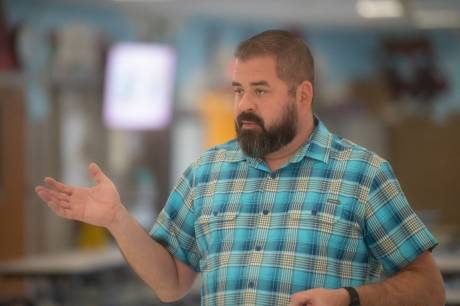
Students at Le Roy Schools are getting broad exposure to STEAM skills and trades (science, technology, engineering, arts and math), STEAM teacher Luke Weaver told the Board of Education on Tuesday during a meeting.
Rube Goldberg Machines, computer coding, food sciences, robotics and drones, and environmental sciences are all getting covered with one class or another, Weaver said.
Superintendent Merritt Holly emphasized what Weaver illustrated during his introduction of Weaver to the board.
"We offer STEAM Club," Holly said. "We offer things in the library. We offer things in the summer. The kids have a ton of opportunities, so there's no like, I'll try this and then I don't care about it again for another year. It's a really a continuing program, which I think is really powerful."
Currently, 10th, 11th, and 12th graders are working on Rube Goldberg Machines and they're excited by the projects, he said.
For those who might not be familiar with a Rube Goldberg Machine, Weaver explained that it is an "unbelievably complicated machine to do an unbelievably simple task. So you would build something with pulleys, levers, catapults, dominoes knocking each other over to do something you could easily do by yourself."
(For an entertaining example of a Rube Goldberg Machine, see the music video below.)
He said when he first introduced the concept to students, they looked at him like he was crazy.
"They went from that mindset to kids coming in in the morning, before homeroom, coming in and start working because they want that extra half hour to work on their project, which is just awesome."
There are 46 students currently enrolled in a coding class. They're starting with blocks of code that fit together to make a working program.
"I've got two kids who are already done," Weaver said. "That is fascinating to me, to see kids who've never done this before, pick this up and be so cohesive going through the process."
The block program will move the students into coding languages commonly used in the business world, such as Python and C++, Weaver said.
The programming experience also moves the students into working in robotics and with drones.
Already this year the school has held a Manufacturing Day, which included a field trip to visit Orcon, Bonduelle, and U.S. Gypsum.
"The kids had an opportunity to see different careers and how many different types of jobs that can happen in one place, which I think is mind-blowing," Weaver said. "I mean, you had electrical engineers, you had manufacturing people, you had artists, anything you could think of at all of these different plants."
The stop at Bonduelle in Oakfield was interesting because spinach was being delivered from a farm owned by one of the student's father.
"So we got to like watch that and see how they go through that whole freeze-drying process and things like that," Weaver said.
An area of expansion for the program that Weaver is working on is aquaponics, he said.
"Aquaponics is basically a huge fish tank that is fully cyclical," Weaver said. "The plants provide the nutrients for the fish and the fish provide nutrients for the plants. You don't have to clean the fish tank. You can grow vegetables, or fruit and grow flowers. They actually have huge systems where people grow or raise tilapia and actually have harvestable fish. We're going to take baby steps and start with a goldfish that are at my house, bring those in. But we're just trying to pull in other kids that might not have that engineering mindset, they might not only want to be tech-savvy, but they might like some natural science stuff."
Weaver also went through some of the entry-level STEAM projects being introduced at Wolcott Street School.
"It's fun," Weaver said. "I love this stuff. I love seeing their faces just confused and excited at the same time. That's exactly what you're looking for."
Photo: Luke Weaver. Photo by Howard Owens.
